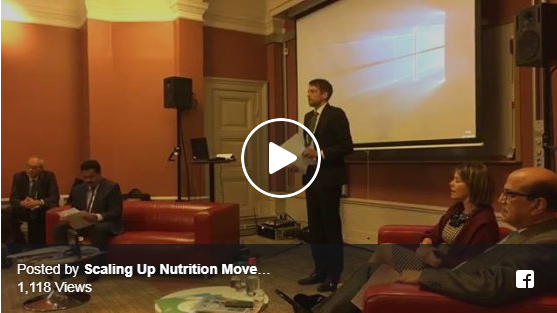45 percent of deaths of girls and boys under 5 years old are attributable to undernutrition. The factors and pathways leading to undernutrition are diverse, complex and most often interconnected: water, sanitation and hygiene (WASH) play a considerable role in these pathways.
From 27 August to 1 September 2017, thousands gathered in Stockholm, Sweden, to exchange ideas, foster new thinking and develop solutions to the most pressing water-related issues. As part of our partnership with SWA, we collaborated for the second year in a row to bring the nutrition narrative into the WASH discussion.
Four WASH-nutrition sessions were held to unpack how the two sectors can be better designed to effectively contribute to the overall achievement of the Sustainable Development Goals. Considerable contributions came from partners WaterAid, Action Against Hunger, Emergency Nutrition Network, Share, the Sustainable Sanitation Alliance, the World Bank, the German WASH Network, and the German Federal Ministry for Economic Cooperation and Development.
SDG-Synergies: Countries link WASH and nutrition to reduce malnutrition
On 28 August, the first session was focused on the linkages between WASH and nutrition policies, budgets, programmes and politics. Opened by Dr. Mushtaque Chowdhury, vice-chairperson of BRAC and a member of both the SUN Movement Lead Group and the SWA Leaders Group, the audience heard about the critical links between both sectors and how leadership on the integration of both issues must be heard at all levels.
Building on this, the perspective of government officials was put at the centre of the discussion from two member countries of the SUN Movement and SWA:
- From Madagascar, Mr Ambinintsoa Andriamboahangy Raveloharison,Coordinator of the National Nutrition Office and SUN Government Focal Point.
- From Nepal, Prof. Geeta Bhakta Joshi,SUN Government Focal Point, Honourable member of the National Planning Commission of Nepal and Coordinator of the National Nutrition and Food Security Coordination Committee.
Both presenters shared the background about the nutrition situation in their respective states and how they are working across sectors, including WASH, to collaborate to ensure cohesive action for better nutrition outcomes. On behalf of a Chad representative who was not able to make the session, Natalia Uribe of Action Against Hunger shared their country case study, with special attention to how actors across civil society organisations are working together with the government on WASH and nutrition linkages.
These presentations were followed by an engaging panel discussion moderated by Catarina de Albuquerque, Executive Chair of SWA. Along with the country presenters, Dr. Stefan Schmitz of the German Federal Ministry for Economic Cooperation and Development joined the panel, sharing his views and showing interest in what countries need to further their good efforts.
Finally, to wrap up the session, Mr Arun Baroka, Joint Secretary, Ministry of Drinking Water and Sanitation, Director of the Swachh Bharat Mission (Keep India Clean Mission) shared how the well-known Swachh Bharat Mission is contributing to nutrition outcomes.
Recording of the event
WASH-Nutrition is growing up
On 29 August, the second WASH-nutrition session was an interactive exchange of the Sustainable Sanitation Alliance’s (SuSanA) Working Group 12 – focused on nutrition linkages. Here, participants built on four thematic areas of focus – academia, advocacy, implementation and capacity building. This work will kick-off more in-depth discussions on the Working Group 12 Discussion Forum – a forum which brings together thousands of WASH actors from across the globe.
Visit the SuSanA Working Group 12 Discussion Forum > http://forum.susana.org/92-nutrition-and-wash-including-stunted-growth
WASH & Nutrition Nexus: An effective approach to stop stunting
On 30 August, presenters from the Max Foundation, and UNICEF spoke about how exposure to fecal contamination via water or surroundings can, in the long term, chronically infect a child’s intestines. This results in reduced absorption of nutrients, contributing to the prevalence of stunting and increased vulnerability. They highlighted that the WASH sector can play a more significant role in reducing the prevalence of stunting and shared the learnings from a pilot programme from Bangladesh.
View the presentations: UNICEF, Max Foundation
Waste, water and undernutrition: Evidence and policy perspectives
On 31 August, the final WASH-nutrition session of the week looked in depth at the informed improvements in multi-sectoral policies and programmes. Oliver Cumming of the London School of Hygiene and Tropical Medicine shared the results of sanitation on enteric infection and child growth based on a peri-urban area of Mozambique. Bethelehem Mengitsu, Country Director of WaterAid Ethiopia formally launched the new publication “The Recipe for Success: How policy-makers can integrate water, sanitation and hygiene into actions to end malnutrition” and lastly, Jane Mumma, of the Great Lakes University Kisumu, shared the effect of early childhood hygiene interventions on enteric infections in Low-Income settlements of Kenya. These learnings culminated in a wrap-up from World Bank Group Water and Sanitation Lead, Martin Gambrill.
View the presentations: Oliver Cumming, Bethlehem Mengistsu, Jane Mumma
Read “Starting life strong in slums: the role of engaging vulnerable groups on sanitation and nutrition,” a Global Alliance for Improved Nutrition (GAIN) and World Bank joint opinion piece.
WASH and nutrition publications
A press conference was held to launch new publications with Catarina de Albuquerque, Executive Chair of SWA, Dr. Prof. Geeta Bhakta Joshi of the National Planning Commission of Nepal and Dr. Jean Lapegue, Senior WASH Advisor of Action Against Hunger. The new publications play an important role in providing the evidence base for stronger policy advocacy and also, resources to be used for better implementation.
 |
 |
 |
 |
|||
|
Download the Link |
Download 2+6=17 English |
Download the Recipe |
From left: Thilo Panzerbieter, Chair of German WASH Network, Dr. Mushtaque Chowdhury, Vice-Chairperson of BRAC, member of the SUN Movement Lead Group and the Sanitation and Water for All Leaders Group, Mr Ambinintsoa Andriamboahangy Raveloharison, Coordinator of the National Nutrition Office and SUN Government Focal Point, Ms Natalia Uribe, WASH Advisor, Action Against Hunger and Dr. Prof. Geeta Bhakta Joshi, SUN Government Focal Point, Honourable member of the National Planning Commission of Nepal and Coordinator of the National Nutrition and Food Security Coordination Committee.


